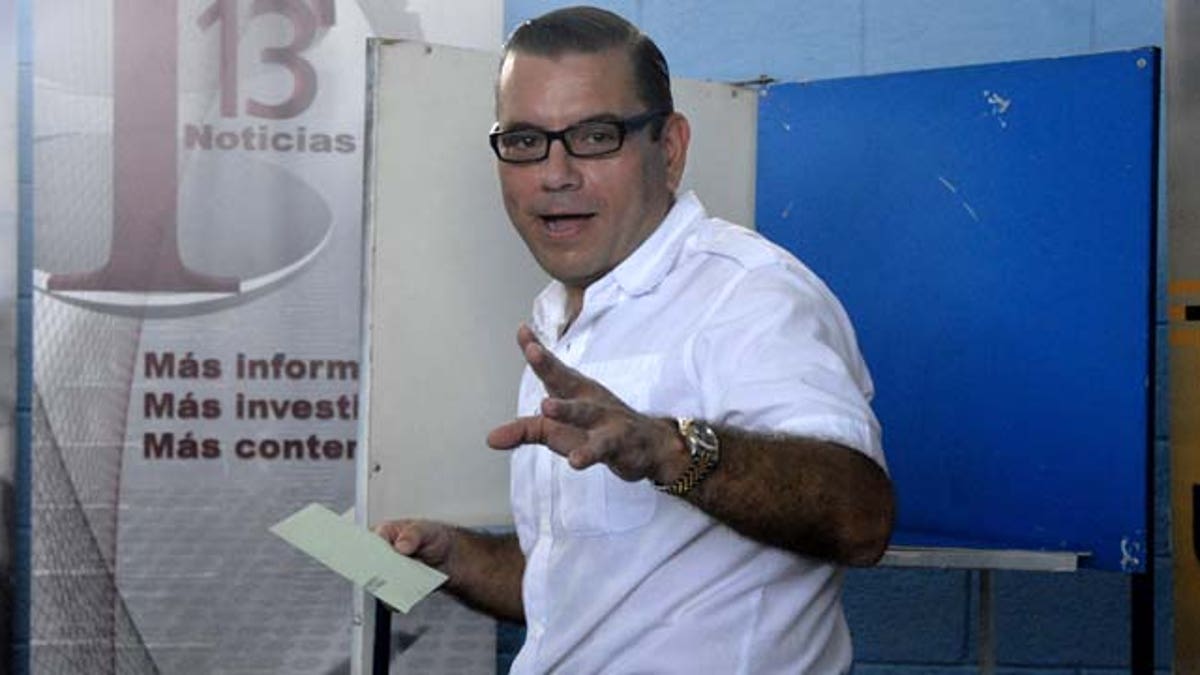
Manuel Baldizon, presidential candidate of Guatemala's Democratic Freedom Revival Party, gestures after marking his ballot in a voting booth during the country's general elections in Peten, Guatemala, Sunday Sept. 11, 2011. Baldizon, a tycoon-turned-political populist is the closest challenger of leading presidential candidate Otto Perez Molina in a field of 10 candidates, according to polls. (AP Photo/Alex Cruz) (AP2011)
Not so fast, candidates.
The presidential election in Guatemala will not be determined until November, after preliminary results in Monday's election showed that the three leading candidates failed to secure 50 percent of the vote.
With 95 percent of the polling stations reporting, Otto Pérez Molina of the Patriot Party received with 36 percent support, followed by businessman Manuel Baldizón with 24 percent and Eduardo Suger with 16 percent.
"We are going to double our efforts, now that we are in the second round," Pérez said after learning he would be in the runoff.
In pre-election polls, Pérez, who promised to get tough on Guatemala's rampant crime, had the support of up to 48 percent of voters. Baldizón had 18 percent and Suger 10 percent. All are right-leaning. Any candidate needed more than 50 percent of the vote to avoid the Nov. 6 runoff. The new president takes office in January.
- Guatemala President Alvaro Colom Says Suspect Arrested in Massacre
- More Guatemalans Intentionally Infected with Syphilis than Previously Reported, Official Says
- Illegal Immigration Pipeline From South Asia to US Passes through Guatemala
- Fireworks, Flutes and Flying Bodies at Guatemala’s Feast of Santo Tomás
- Behind the Scenes With Kat De Luna and Fox News Latino
- Miracle at the Mine
But Pérez garnered far less, as Baldizón's support increased in the weeks leading up to the election.
Baldizón's support also may have been lower in the polls because people were embarrassed to say they would vote for him, according to former Foreign Minister Edgar Gutiérrez, who heads a political think tank in Guatemala.
Baldizón, a tycoon-turned-political populist, made many promises that some considered outlandish, including that he would take Guatemala's soccer team to the World Cup. But other promises were appealing in a country with rampant poverty, including a pledge to boost salaries and social programs, to employ the death penalty, now rarely used, and to televise executions. Gutiérrez said that greater support than expected for Suger also cut into Perez's lead, but that those votes will likely go to Pérez in the runoff.
Pérez would be the first former military leader elected president in Guatemala after the end of the military dictatorships of the 1970s and '80s.
A U.N.-sponsored truth commission found that 200,000 people were killed in Guatemala's 36-year civil war, 93 percent of them by state forces and paramilitary groups. Still, many credit Pérez with playing a key role in the march toward democracy, including negotiating the 1996 peace accords that ended the conflict.
Campaigning focused on fighting the street gangs and Mexican drug cartels operating in the lawless border region that have given Guatemala one of the highest murder rates in the Western Hemisphere. The candidates almost all leaned to the right after the center-left party of outgoing President Alvaro Colom failed to field a candidate.
Violence is epidemic in this nation of 14.7 million people, and organized crime has overrun many regions. Guatemala has a murder rate of 45 per 100,000, according to a report by the World Bank.
Seventy-five percent of Guatemalans live in poverty, and the indigenous and rural poor who were most hurt by the war are also bearing the brunt of the current violence.
This article is based on the Associated Press.
Follow us on twitter.com/foxnewslatino
Like us at facebook.com/foxnewslatino




